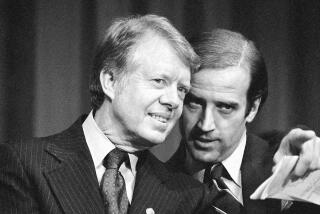Gorbachev Scorns Reagan Advice on Human Rights : No Change in Policies, He Declares
- Share via
MOSCOW — Soviet leader Mikhail S. Gorbachev said today that there will be no changes in his country’s human rights policies despite President Reagan’s emphasis on this issue during the Moscow summit.
Hours after Reagan left Moscow at the end of the five-day summit, Gorbachev told several hundred peace activists that the Soviet Union “will not accept any advice on how we run our affairs.”
“We do not need anyone else’s model. We do not need anyone else’s values,” he said.
Reagan highlighted human rights by meeting with dissidents and Jewish refuseniks during his visit to Moscow and by stressing the issues of freedom of expression and economic creativity in speeches and his talks with Gorbachev.
But Reagan also ran into trouble with some refuseniks for remarks he made later in the visit seeming to absolve Gorbachev of responsibility for Jewish emigration restrictions.
Gorbachev, the Soviet Communist Party leader, told a news conference Wednesday that he was “not filled with admiration” for Reagan’s meeting with the dissidents and refuseniks.
Need to Respond Further
But today, he told the several hundred peace activists gathered in the circular blue-and-white Sverdlov Hall in the Council of Ministers building of the Kremlin that he felt the need to respond further.
“We are far from imagining our country perfect in all respects,” Gorbachev said. He said the problems that Reagan mentioned “do take place, but . . . this is not an overall picture of Soviet society.”
“I told the President that we have our own view of the human rights situation in his own country,” Gorbachev said. He said the two countries told a working group formed to tackle the problem that “we’re open and ready for any discussion on this matter.”
About 40 peace activists from the United States, Western Europe and elsewhere praised Gorbachev for his role in completing the superpower treaty banning medium- and shorter-range nuclear missiles. Reagan and Gorbachev exchanged instruments of ratification for that treaty Wednesday.
“He’s the statesman we’ve been waiting for,” said Marty Coleman of Pasadena, Calif., who gave Gorbachev a small toy from her granddaughter to give to his granddaughter Oxana.
The 57-year-old general secretary laughed and chatted like an American politician on the stump with others who walked up to the wooden dais where he sat to present him with a solar-powered watch, an American Indian peace pipe, a Chicago Bears football team sweat shirt and other gifts.
American Indian Issue
Among the human rights problems that the Soviets say exist in the United States is the situation of American Indians.
At the request of Russell Red Bear, an American Indian present at the meeting, Gorbachev autographed a copy of his book “Perestroika” for former American Indian Movement leader Leonard Peltier.
Peltier was convicted in 1977 of murdering two FBI agents and is jailed at Leavenworth Penitentiary in Kansas. Peltier insists that he is innocent, and Soviet media cite his case as an example of what they say are human rights abuses in the United States.
Reagan, answering a question from a Soviet student, said the United States may have made a mistake when it “humored” Indians by giving them reservations instead of integrating them into society.
Indian representative Anthony Gonzales of San Francisco told Gorbachev that Reagan’s remarks at Moscow State University Tuesday were “typical of American racism.”
Gorbachev also criticized once more Reagan’s “Star Wars” program for a space-based shield against nuclear attack. “We should drag the Americans away from the realm of military space to peaceful space,” Gorbachev said.
More to Read
Sign up for Essential California
The most important California stories and recommendations in your inbox every morning.
You may occasionally receive promotional content from the Los Angeles Times.












